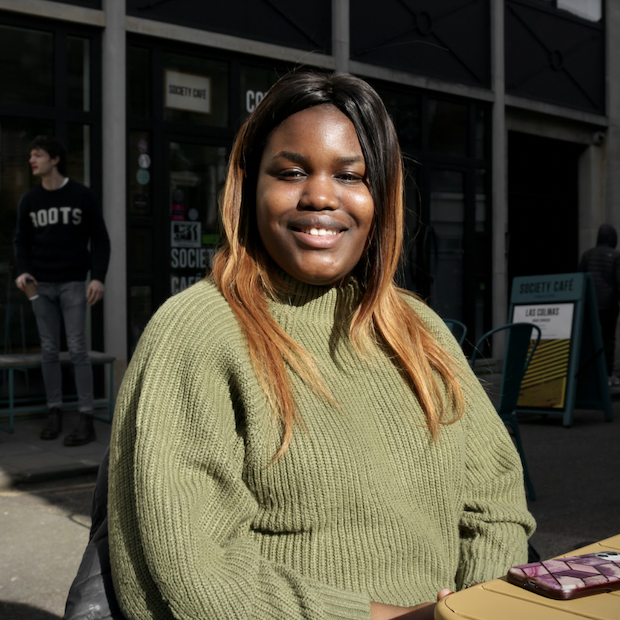God is Dead, but lots of us miss him.
We look for his shadow in astrological charts, turn that shadow into beams of light that reactivate purple crystals, and then bend quantum physics into crystalline shapes.
I garner spiritual fulfilment through the practice of yoga and have felt smug at my rejection of too much of the attendant ‘woo-woo’. If I hadn’t, you see, I would have had to break up with my boyfriend, whose stars are totally incompatible with my own; and that was definitely not the right thing to do. Spirituality without religion, Sam Harris promised me (see Waking Up, 2014), is something I could find without depositing faith from one dubious source to another.
Atheism has been an intellectual possibility in Western thought since the 19th century. ‘God is dead. God remains dead. And we have killed him’, declared Friedrich Nietzsche in his work of philosophical fiction, Thus Spoke Zarathustra (1883-5). The Enlightenment welcomed in new ideas of a universe governed by scientific laws where there had once been Christian divine providence; Darwin’s theory of Evolution, the development of Higher Criticism in Germany which proved Biblical scripture to be a historical document, and the discoveries of geology all ripped a Christian God away from the fabric of European society. Accordingly, the question of His existence does not come up in conversation with my friends. A few are religious; most are not.
So, when I arrive at C. S. Lewis Society, I do not know that it is a Christian society. I do not attend in some kind of challenge to myself; I think that, as a Harry Potter fan who has been deprived of magic in adulthood, the mysteries of Narnia will nourish my inner child. I am surprised, then, when a girl with dark curls stands up and starts reading aloud from Lewis’s The Four Loves:
‘‘God is love’ says St John’; this is how the book begins. Oh no. I quickly realise my mistake – of course, C. S. Lewis was a devoted Christian. It would have been absurd to have a society devoted solely to him that wasn’t religious.
The Four Loves distinguishes Eros from Friendship, Affection and Charity. I like the sound of it and will order it on eBay that evening when I get home. What makes it such a delightful book is that it addresses questions of love with total sincerity, and consequently, I find myself open to receiving them in earnest. It’s not that a secular book – maybe self-help style – couldn’t do the same; it’s just that I imagine finding it repulsively cringey. Perhaps this is my own problem – that I must receive ‘big’ ideas padded with irony or veiled beneath a layer of fiction. Only, belief in a deity does allow you to approach these questions – questions that we have been and will always be concerned with – with such clarity and unflinching candour.
But I am a flincher. Do I believe in God? I blush even asking myself. I feel intellectually inadequate, late to the party, and wholly bamboozled.
It’s not that I have an aversion to talking about Him – I grew up going to church fairly regularly, and since my teenage years we’ve done the ‘right’ thing of attending at Christmas and Easter and I have always enjoyed it. But I’m not sure if church is really about God for me. It is about family, ceremony and smells; it is space to think, time outside of normal life marked by wine and white robes and wood under-body.
This church-as-contemplative-space thing I’ve got going is one way of trying to reconcile rationalism with religion, and I feel comfortable with it. But C. S. Lewis Society – a Christian society – this is the real deal, a level up, a stretch. I feel nervous that I might leave the room Reborn and not even know how it happened. Staying silent, clandestine, I listen as members take turns to read passages aloud; and once the shock subsides, begin to enjoy the intimacy of sharing in this small group.
People have been trying to prise worship apart from God for a long time: in 1799, Reformed theologian Friedrich Schleiermacher gave an address in which he declared ‘God’ no more than an allegorical tool for reflection, and worship ‘pure contemplation of the Universe’, so that ‘belief in God, and in personal immortality, are not necessarily a part of religion’. Almost 170 years later, John T Elson wrote in Time magazine that, ‘even within Christianity . . . a small band of radical theologians has seriously argued that the churches must accept the fact of God’s death, and get along without him’. Should we embrace a cultural life of faith absent of any supernatural claims, and pray to a dead God? I suppose that, inadvertently, this is what I have been trying to do. But as the meeting continues, my way of inhabiting religious space starts to feel like a compromise and not an answer; and I realise that I experience some indifference when it comes to worship because this middle ground demands very little by way of conviction.
But this is about life! And death! I must commit, I realise at C. S. Lewis Society. Or, at least, I must try and have a good old think about this transcendental stuff.
When the meeting ends, I follow some members into the chapel of Pusey House for the Compline service and contemplate the Universe, Schleiermacher-style, by candlelight and song. It is undeniably beautiful.
And then the next week, I return to C. S. Lewis Society. And the next. And then the next.
At the end of the fourth session, it is announced that Stewart Lee will be coming to speak next week. Stewart Lee! The stand-up comedian Stewart Lee? No – it isn’t, I’m afraid. Dr Stuart Lee is a Professor in the English department. Oh.
Dr Stuart Lee, Professor in the English department, leads us through an excellent close text analysis of a passage from the Lord of the Rings, referencing J. R. R. Tolkien’s On Fairy-Stories (1939) which has been mentioned several times already at C. S. Lewis Society (where I still haven’t spoken a word): a long essay which discusses the fairy-story as a literary form. This sounds very inner-child-friendly and God-free, and so I read it in the quest for new directions. If we are to live without God, we are to be responsible for enchanting our own lives; and what better way to do this than through fantasy, I suppose.
Tolkien quickly mentions our cultural affliction: “rationalization’ transformed the glamour of Elfland into mere finesse’ he writes, which ‘seems to become fashionable soon after the great voyages have begun to make the world seem too narrow to hold both men and elves’. The problem is not that we do not have fairy stories anymore, then, but that we do not allow them the space to charm our lives. Perhaps all we must do is widen our world again with the mysteries of magic! Tolkien argues that the use of imagination to create a world that is rational and consistent and yet different from our own can lend us fresh insight into life; ‘it was in fairy-stories that I first divined the potency of the words, and the wonder of things, such as stone, and wood, and iron; tree and grass; house and fire; bread and wine’, he writes. Unchallenged preconceptions will be challenged in these new worlds, he believes; their wonders will bring us joy, and they will help us to be more moral.
On Fairy-Stories is not as God-free as I had hoped, but it offers me a new way of living with religion. The essay ends with Tolkien asking us to consider Christianity: ‘The Gospels contain a fairy-story, or a story of a larger kind which embraces all the essence of fairy-stories . . . and among its marvels is the greatest and most complete conceivable eucatastrophe. The Birth of Christ is the eucatastrophe of Man’s history’. I recall the magic of living through a novel, a film or a good television show; the way it colours interactions with friends, walks through the park and the way that I see myself in the mirror for those few days in which my consciousness is bound up with a seductive storyline. I am excited, thanks to Tolkien, by the idea of bewitching my life with the ancient stories of Gods in a similar way; so that I can live through them and believe in them and at the same time never believe in any of it at all.
In 1946, faced with the meaninglessness of human life in a world without God in the wake of the horrors of the second world war, Jean-Paul Sartre declared that ‘existence precedes essence’: that our life is only as meaningful as we choose to make it. This might sound like if-you-work-hard-you-will-succeed messaging, which we all know isn’t true in a society rife with inequalities, but Sartre distinguishes Facticity – the facts about ourselves and the circumstances that constrain us – from Transcendence – our freedom to act. Actualising our potential by doing (within the constraints of our Facticity) is the path to existential freedom – and denying this freedom, Sartre says, plunges us into anxiety. Nevertheless, existential theory has been an uplifting driving force in my life; it shows us how to derive significance from coincidence, absurdity and meaninglessness, and reminds me that ‘I could have been good at the piano’ isn’t the same as being good at the piano. The problem is, existentialism doesn’t leave much room for worship: its entire premise is meaning-making sans God.
Maybe the Psychedelic Society can help me. I attend a talk – the Art of Self-Inquiry – that they host with artist Rupert Spira, who whispers us through a guided meditation. Ignoring standard practice of upright-sitting, I lie on the floor: my neck and back are sore, which I deserve because I have totally abused the rules of anatomical wellness this week. Spira introduces us to the principles of a non-dual understanding that is the essence, he says, of all the great religious, philosophical, and spiritual traditions. This is the recognition that underlying the diversity of experience there is a single, indivisible and infinite reality that is, as far as I understand, a universal consciousness. Our individual consciousness – which is the only thing that we know to be true, and which feels like an independent existence – is actually part of a unified whole; and the nature of this unified whole, says Spria, is happiness.
Taking some initiative, I have cultivated a ball of light around myself, representing – quite suitably, although perhaps unoriginally – my independent consciousness. Behind fuzzy eyelids, I push the ball into a big pool of everyone else’s. According to Spira, recognition of this reality is foundational for any sustainable relationship with the environment, and the basis for peace between individuals, communities and nations. This experience of consciousness resonates more as ‘peace’ to me than ‘happiness’; but nevertheless – I like it. If the need for religion is a result of our insecurities in the face of nature and an unintelligible universe, Spira’s theory integrates me into the cosmos, and it is comforting.
At the end of a long stint of societies, essays and talks, yoga poses and conversations, I still have some questions; but I know for sure that the act of inquiry has been an enriching and fruitful one. For now, it is time to pause and see how this hodgepodge of ideas holds up in the big bad Real World.
And Stewart Lee did come to Oxford; I saw his stand-up show, Snowflake/Tornado at the Playhouse in January. It did not disappoint. Maybe he’s even worthy of worship…





